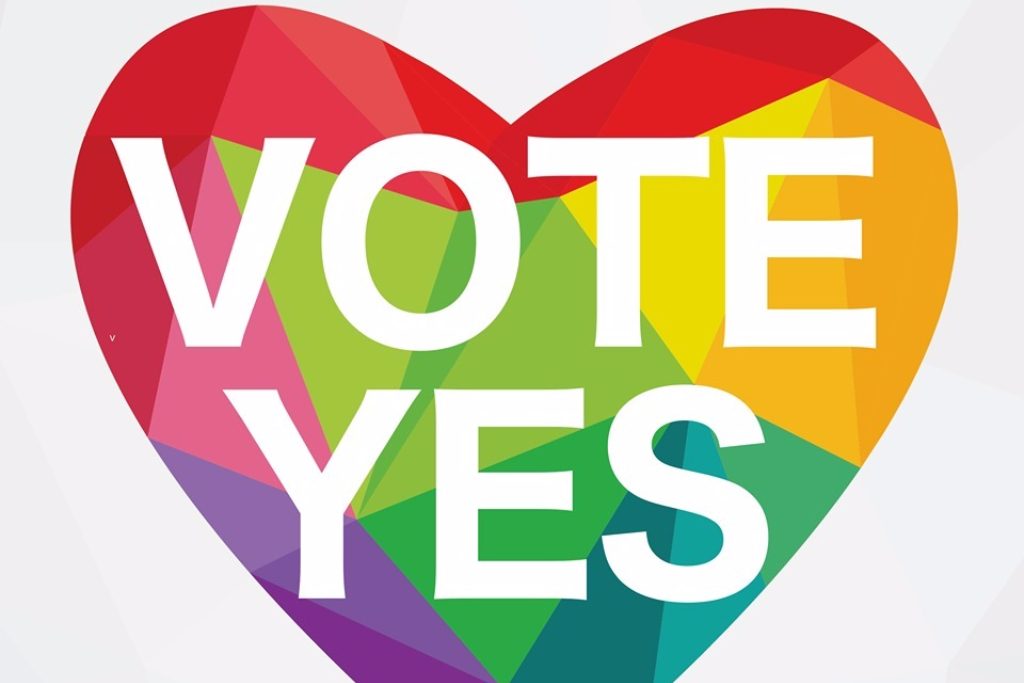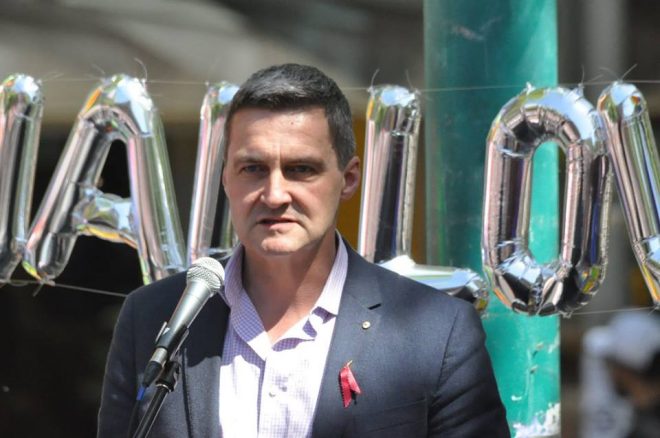The No Campaign Wants To Divide Our Community. We Cannot Let Them
A leading Yes campaigner on what the No side is really trying to do.

It’s clear that the No campaign in the upcoming marriage equality postal plebiscite will attempt to poach wavering Yes voters by dog whistling to old fears and prejudices about LGBTQI+ people and children.
They will tell untruths about the Safe Schools program, bang on about motherless families and offend two minorities at once by referring to the children of same-sex couples as a new “Stolen Generation”.
It’s also becoming clear that one of the No campaign’s main strategies will be to argue that marriage equality will somehow violate freedom of speech and religion.
How Will They Prosecute The No Case?
A bill that legalises marriage between "any two persons" raises issues beyond marriage.. 1/2
— Tony Abbott (@TonyAbbottMHR) August 20, 2017
..E.g. would it be possible to exclude gender fluidity discussions from schools if gender fluidity is contemplated by the Marriage Act? 2/2
— Tony Abbott (@TonyAbbottMHR) August 20, 2017
A two-pronged strategy is emerging: First, they are insisting that the postal vote should be based on marriage legislation with absurdly wide exemptions that would allow discrimination in the name of “protecting freedom of speech and religion”.
Former prime minister John Howard has already called on the Government to consider allowing service providers without direct links to religious marriage services (eg. bakers and florists) to be able to refuse service to same-sex weddings.
What’s really going on here is that opponents of marriage equality are seeking to win the postal ballot by dividing the Yes vote between those willing to accept discriminatory caveats and those who aren’t.
It’s exactly the same strategy Howard and Tony Abbott successfully used to divide republicans and maintain the monarchy in the 1999 Republic referendum.
The second part of the strategy appears to be a Commonwealth override of state-based anti-discrimination laws, again with the gloss being “the need to protect freedom of speech and religion”.
The target would be two-fold: stopping mainland states from narrowing their religious anti-discrimination exemptions, and invalidating Tasmania’s strong anti-hate-speech provisions.
In recent weeks several high-profile conservative figures have attacked the Tasmanian laws, saying a Commonwealth override may be necessary.
They believe the Commonwealth has the power to do this because the Tasmanian law is “incompatible with Australia’s international human-rights provisions”.
There is great historical irony in such an assertion.
What We Can Learn From Tasmania

Rodney Croome
In the 1990s Tasmania’s draconian laws criminalising homosexuality where finally struck down by the federal government and the High Court because the UN Human Rights Committee found they breached Australia’s international human rights obligations.
Now, opponents of equality are using a similar human rights narrative, this time centred on religious freedom, to encourage the federal government to override a law that protects LGBTI people from hate speech.
They will say an override is necessary because of the case of Archbishop Porteous, who has become a hero of the right after a booklet against marriage equality that he distributed was subject to an anti-discrimination claim.
Spinners of the Porteous martyrdom myth say he was dragged before a court simply for stating the traditional Catholic view of marriage.
The myth conveniently ignores the facts: the case was actually about the booklet’s suggestion same-sex couples mess with children, it was dropped after Porteous refused to amend the offending sentence and all he had to endure was a short, voluntary mediation process. He was never “in court”.
The other excuse for an override will be that the Tasmanian Parliament has failed to protect “freedom of speech and religion”.
Just two weeks ago the state Upper House overwhelmingly voted down a State Government push to allow religious hate speech.
It also blocked a move from a lone MP to weaken the provision against offensive and humiliating language, which applies on many grounds including sexuality, religion, disability, gender, relationship status and age.
Why Was There Such Attachment To The Tasmanian Law As It Stands?
Weakening Tas hate speech law would allow this. How would it improve Tassie? #taspol #auspol https://t.co/xo4lOT58mW
— Rodney Croome (@RodneyCroome) July 21, 2017
Tasmania’s strong hate speech laws were enacted directly after homosexuality was decriminalised in 1997 because the decriminalisation debate had been so hateful and destructive.
Tasmanians didn’t want to see that happen again and opted for higher standards in public debate.
In recent weeks the Upper House was reminded of the importance of protecting vulnerable Tasmanians from hate, not just by LGBTI advocates but also by advocates for people with disabilities.
The overwhelming majority of complaints about hateful and offensive language under the Tasmanian law come from people with disabilities.
The other reason Upper House members found compelling in favour of keeping the current provisions is that there are already laws that protect public officials, including politicians, from offensive language. The salient difference between these laws and Tasmania’s Anti-Discrimination Act is that the former protect the powerful, and the latter protect the vulnerable.
Whether opponents of marriage equality have the influence to pass legislation that would override the Tasmanian laws, and whether they would win an inevitable High Court challenge is uncertain — and it doesn’t really matter.
The goal of the No campaign will be to divert debate away from marriage to their favoured field of battle — in this case, “religious freedom”. They want this debate to be about anything other than marriage.
So how should we respond to the push to divide and distract the Yes campaign with mischievous arguments about freedom of speech and religion?
Don’t Get Sucked In By The False Choice
Should we ignore attempts to punch holes in anti-discrimination laws in order to focus on winning a Yes vote or should we campaign to keep anti-discrimination laws intact, risking the postal vote outcome and potentially delaying marriage equality?
I believe it is a false choice.
We can campaign both for marriage equality and against weakening anti-discrimination laws.
The many millions of Australians who support marriage equality understand both issues are linked by the principles of fairness and equality.
They also understand that with every right comes an equal responsibility not to abuse that right by harming other people.
That said, I also believe the views of the LGBTI community on pivotal choices like this matter.
In recent times groups like just.equal and Parents and Friends of Lesbians and Gays have begun surveying the LGBTI community on key strategic decisions such as whether to support a plebiscite or a postal vote.
These surveys have guided our policy.
It may well be time to again survey the LGBTI community about whether we should vote “Yes” for a compromised bill and whether advocates should put equal effort into both achieving marriage equality and stopping the movement to weaken discrimination protections in the name of “religious freedom”.
—
Rodney Croome is one of the leading campaigners for a Yes vote, and was instrumental in overturning Tasmanian laws that outlawed homosexuality in the 1990s.